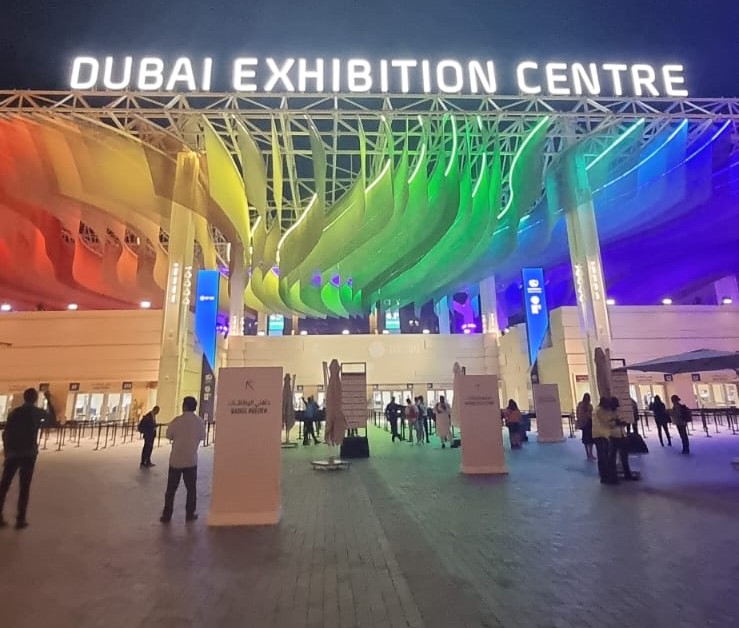Reflections from an Israeli Delegate at the UN Climate Conference in Dubai
Even in these dark times, Israelis must hold on to the imagination, ingenuity, and entrepreneurial spirit to face the global challenges that lie ahead.

A strange, even jarring feeling accompanied Israel’s participation in the UN Climate Change Conference this month in Dubai. The bright colors, the festivity of humanity and environmentalism, the magnificence of the host city, and especially the light in the delegates’ eyes, determined to save the world: it was all just a different world than the fighting, shock, and mourning in which Israel has been immersed since October 7. Occasionally, we had a striking and painful reminder of the situation back home, triggered by the sight of a local wearing the hostage dogtag on his galabiya.
Although Israel decided not to cancel its participation in the conference this year, the Israeli delegation was smaller than planned. The size of the Israel pavilion, originally set to be large and to host many events, was also cut down. The decision to attend, however, proved to be the right one—even though the pavilion was modest, it attracted many visitors from all over the world, who, in addition to displays of advanced Israeli climate technologies, were exposed to the poignant display that focused on the hundreds of Israeli hostages still being held prisoner in Gaza.
Paradoxically, there was something comforting in the realization that the problems that troubled us before October 7 will still be with us thereafter. That may be why I was keen to attend the conference again this year, despite the devastating war consuming my home—it was a way to preserve a tiny bit of normalcy in the midst of all the madness. The challenges we face with the climate crisis are not going away, with or without a war, and may even get worse in its wake.
The event I took part in, held in the Israel pavilion, dealt with ways to leverage Israel’s advanced climatech industry in order to achieve stability and prosperity for Israel and its neighbors. Because climate change does not respect political boundaries, we all need to work together to counter its impact. The old cliché that in the midst of every crisis lies an opportunity is valid here too; the climate crisis has created a unique confluence of interests between Israel and the other countries of the region, most of which are starting from a far worse position than Israel. Some 20 of us sat down together, Israelis and others, including entrepreneurs, diplomats, and other stakeholders, to discuss different manners of climate cooperation in the Middle East. The session, which was planned months before the war began, took on special relevance when it addressed the question of how climate innovation methods can be employed for the necessary rebuilding in our region after the war. This means not only physical reconstruction, but also the rebuilding of the trust between Israel and its neighbors (those who had normalized relations with us even before the war), as we join forces to combat the climate change that imperils us all.
For those who do not live and breathe this field, climate change is often perceived as a secondary danger (at best). In fact, the pavilions of other countries included a display about a rare bird on a tropical island that is at risk of extinction and a novel drinking straw that has no carbon footprint because it is made from horse manure. Back in the Israeli pavilion, however, the terrible situation smacked you in the face. The climate crisis suddenly assumed the form of a political agent that is another key factor in the ensemble of geostrategic considerations that must be weighed. The preparations for climate change and ways of dealing with its implications provide Israel with an opportunity to bolster its international and regional standing while improving its strategic ties with other countries in the Middle East. It simultaneously allowed Israel to brand itself as an advanced and innovative economy that offers a broad set of tools for dealing with the problem. One of the insights I gained from my trip to Dubai (which gave the Israeli delegation a cordial welcome, despite—or perhaps because of—the current war) is that when the war is over, we will have to direct resources to climate diplomacy as part of the effort to preserve and expand the Abraham Accords.
Israel now finds itself in one of its most difficult hours. We must remember, however, that when the war with Hamas is over, we will still be facing not only the crises that preceded it but also the opportunities. Since launching a major climatech project last July, the Israel Democracy Institute and our partners—EcoPeace Middle East and Start-Up Nation Central—have become aware of the outstanding capabilities in Israeli society and especially in the world of climatech. Traits such as imagination and ingenuity, entrepreneurial spirit, curiosity, the need to turn the impossible into the possible, and especially the concerned attitude of so many fine people from this very special place: all this has been evident from the time the project began up to this special event in Dubai. They are the reasons that Israel is considered to be a world leader in producing innovative solutions for dealing with climate change. We must hold on to this dim spark of hope, even in the difficult situation in which we find ourselves today. The day after the war, while we are still healing from the unimaginable pain of this war, we will also remember that we have the tools and conditions to deal with the challenges that face us down the road in a way that will make us stronger as we advance towards the future.
